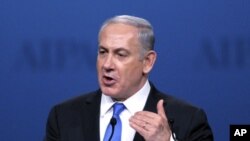Israeli Prime Minister Benjamin Netanyahu says his country cannot afford to wait much longer for diplomacy and sanctions to deter Iran’s nuclear program.
Speaking to the American Israel Public Affairs Committee, AIPAC, Prime Minister Netanyahu said all options are on the table to keep Iran from obtaining a nuclear bomb.
“The Jewish state will not allow those who seek our destruction to possess the means to achieve that goal," he said. "A nuclear armed Iran must be stopped.”
Netanyahu’s remarks followed a meeting at the White House with President Barack Obama, who urged the Israeli prime minister to give sanctions time to curtail Iran’s nuclear ambitions.
Netanyahu says sanctions are hurting Iran’s economy but Tehran’s nuclear program continues to march forward.
“My friends Israel has waited, patiently waited, for the international community to resolve this issue. We have waited for diplomacy to work. We have waited for sanctions to work," added Netanyahu. "None of us can afford to wait much longer.”
Prime Minister Netanyahu praises the alliance between the United States and his country, but says when it comes to Israel’s survival, it must always remain the master of its own fate.
Iran denies it is pursuing a nuclear weapon, saying its program is for peaceful purposes.
Dennis Ross, a former senior advisor to President Obama on the National Security Council, is a senior analyst at the Washington Institute for Near East Policy. He says if Iran produces a bomb, it is likely to start a nuclear arms race in the Middle East.
“The prospect of there being a nuclear war would be quite high. This is not the same as the Cold War where you had only two actors and where those actors had communications. This is a place where no country would feel that they could afford to be second, in terms of striking," said Ross. "Everyone would be acting on a hair trigger.”
Tania Cobb, an activist who came to Washington from California to attend the AIPAC convention, says despite assurances from President Obama, she is still nervous about the possibility of Iran obtaining a nuclear weapon.
“We missed the mark with North Korea. We have missed the mark in many other situations as well," she said. "This is a very sensitive issue where we cannot afford to make a mistake.”
Both Israel and the United States oppose a policy of containing an Iran armed with an atomic bomb.
However, officials from both countries have expressed different views on what might trigger military strikes against Tehran’s nuclear program.
Netanyahu Says All Options Available to Prevent a Nuclear Iran




